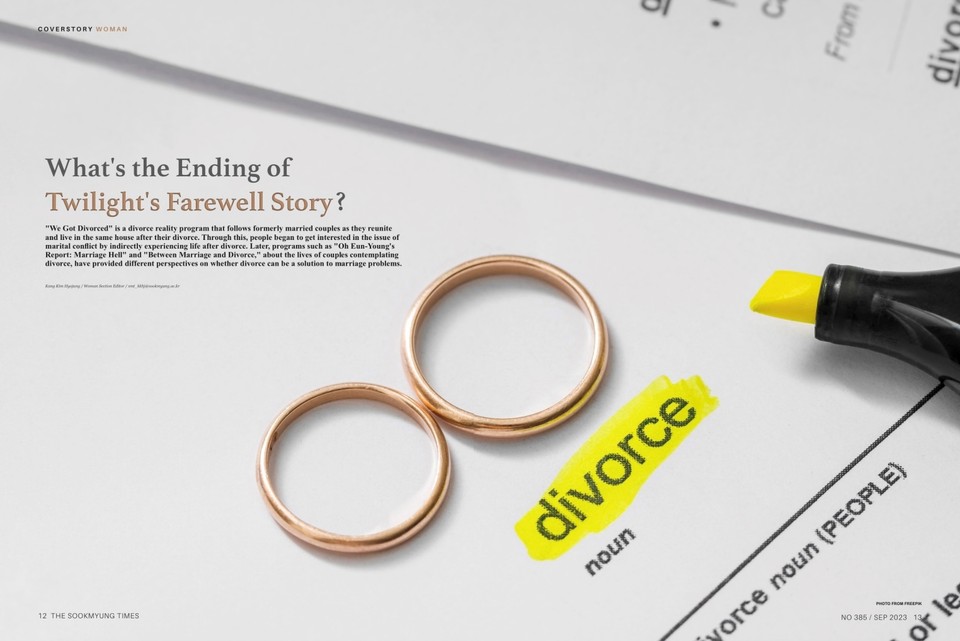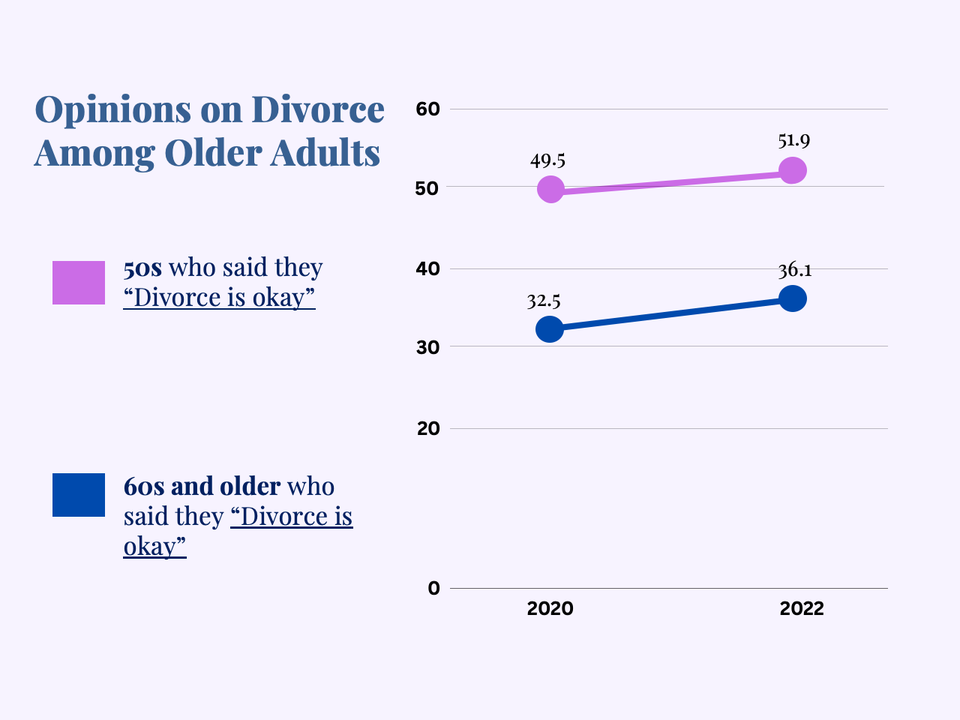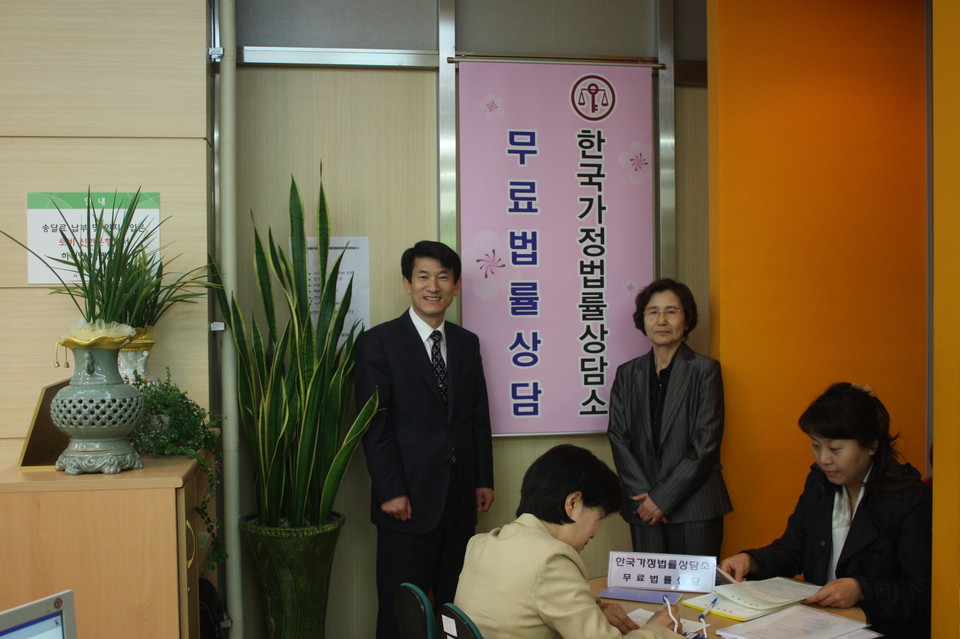
"We Got Divorced" is a divorce reality program that follows formerly married couples as they reunite and live in the same house after their divorce. Through this, people began to get interested in the issue of marital conflict by indirectly experiencing life after divorce. Later, programs such as "Oh Eun-Young's Report: Marriage Hell" and "Between Marriage and Divorce," about the lives of couples contemplating divorce, have provided different perspectives on whether divorce can be a solution to marriage problems.
Why break up at dusk?
Social attitudes toward divorce are gradually changing. This recent shift to a more accepting society toward divorce is especially pronounced among the older and more senior population. According to statistics, in 2020, 49.5 percent of people in their 50s and 32.5 percent of people in their 60s or older said divorce is okay, compared to 51.9 percent and 36.1 percent respectively in 2022. It reflects the growing number of older adults who see divorce as a personal choice. This shift in attitudes toward divorce among them is leading to a rise in so-called "twilight divorce" among older couples who have been married for more than 20 years. According to Statistics Korea's "Marriage and Divorce Statistics 2022," the divorce rate for couples who had been married for more than 20 years was 30.2 percent out of a total of 114,816 divorces in 2012, and 36.6 percent out of 93,232 in 2022. It suggests that the twilight divorce rate is on the rise, and middle-aged and older people are becoming less satisfied with their marriages.
The unsatisfying marriages of those seeking divorce are revealed in counseling. According to the 2022 Counseling Statistics released by the Korea Legal Aid Center for Family Relations, 736 women in their 50s and 768 women over 60 received divorce counseling, while 202 men in their 50s and 428 men over 60 did. The total number of older women considering divorce is 1,504 while the total number of men is 630; in other words, about 2.4 times more women than men are seeking divorce. According to statistics, violence and mistreatment by the husband are the major reasons why older women want a divorce. It indicates that many older women have been severely assaulted, abused, or humiliated during their marriage. One 91-year-old woman, who decided to divorce, said "When my children were young, I was beaten by my cheating husband and went to a counseling center, but I thought that if I divorced, my children would live in poverty. Yesterday, I was also beaten by my husband, and I feel sorry for myself."1) She had been exposed to constant spousal infidelity and violence but was hesitant to divorce because of her children and financial concerns. However, approaching old age, she realized that her marriage was suffering from domestic violence and decided to seek a twilight divorce. In this case, the twilight divorce stems from the fact that the woman, who had previously emphasized family, found it difficult to continue the marriage in consideration of her personal life.

What will she face on the road to divorce?
Divorce is considered as a solution to ensure freedom and happiness for individuals who have experienced an unhappy marriage in their lives. However, older adults who decide to divorce often face economic and psychological challenges. In particular, older women are at a disadvantage when it comes to gaining economic independence to make ends meet. According to Statistics Korea's Economic Activity Census statistics in 2022, the economic activity participation rate for men in their 50s was 90.2 percent and 59.1 percent for men over 60. Meanwhile, the economic activity participation rate for women in their 50s was 68.7 percent and 37.6 percent for women over 60. The participation rate for older women is more than 20 percentage points lower than for older men. Jung Soon-dul, a professor at Ewha Womans University, said, "Elderly women who have lived in a social atmosphere of 'men are breadwinners and women are housewives' have not had the opportunity to work or have only worked in repetitive jobs such as service jobs, making it difficult for them to escape low wages in the reemployment market."2) She explains that women's economic and social activities were limited because they were mainly engaged in domestic work, while men held economic power within the family. Influenced by the patriarchal system, today's elderly women are in a system that makes it difficult for them to be economically active. Also, the reality of women working in low-wage and low-skill jobs suggests that elderly women who want to reenter the workforce or are currently working are likely to be limited to jobs with precarious working conditions and limited career advancement. It presents a society where economic independence is difficult for women and there are limitations for women to earn a living through economic activity after a divorce.
This low participation rate of women in economic activities coupled with elderly poverty increases the economic difficulties of women after divorce. According to the Korea Institute for Health and Social Affairs 2022 Poverty Statistics Yearbook, the elderly poverty rate for men is 32.7 percent and the elderly poverty rate for women is 43.9 percent. It means that women are more likely to face economic problems than men living alone after a divorce. In other words, female seniors living without a partner are the most vulnerable to poverty. Regarding this, Kang Sung-ho, a researcher at Korea Insurance Research Institute, said, "The increase in twilight divorces has led to the fragmentation of elderly households, which can lead to an increase in elderly poverty by weakening their income. Focusing only on old-age income will not solve the problem of the poverty rate caused by household fragmentation, so income policies that reflect changes in household types are needed."3) He is concerned that changes in the composition of elderly households due to divorce are exacerbating the elderly poverty rate, and emphasizes the need for policies that adapt to changes in household composition to alleviate it. It seems necessary to take measures that take into account that the group most vulnerable to elderly poverty after divorce is elderly women.
Twilight divorce not only causes economic problems, but also psychological problems such as loneliness due to the lack of social integration. According to the Seoul Metropolitan Government's 2021 Survey of Single-Person Households, 62.1 percent of all single-person households and 64.8 percent of older single-person households feel lonely. It shows that older single-person households feel lonelier after a divorce than the average single-person household. This loneliness stems from a lack of social inclusion, which leads to feelings of social isolation. According to statistics, among single-person households feeling socially isolated, divorced and separated people had the highest rate of social isolation at 15.5 percent. Jin Mi-Jung, a professor at Seoul National University, said, "Because the most important social relationships in their life are gone, feelings of deprivation, loneliness, or isolation may follow a twilight divorce. If the social disconnection continues for a long time, there is a possibility that issues such as elderly poverty and social isolation may become serious social problems."4) She pointed out that a twilight divorce breaks up a long-standing relationship with a spouse, which can lead to a range of emotional problems. This implies that twilight divorce can cause psychological problems, which can lead to social problems.

How to seek women's independent life
Women's lack of economic independence is caused by structural factors that dictate that women are responsible for domestic work which is not recognized as labor. To address these issues, the Civil Act guarantees the right to claim for property division in divorce. Through this, the court can determine the amount and method of property division, considering each party's contribution to it. The claim for division of property states that property procured by the cooperation of the couple is subject to division. It means that all property acquired during marriage is the result of the couple's cooperation and must be divided jointly in the case of divorce. This recognizes the economic value of domestic work, which is mainly performed by women, and considers that such work has contributed to the formation of joint property. In addition, when considering the contribution to the property achieved through the cooperation of the couple, various factors are considered. Moon Gun-hee, a lawyer, explains, "In recent years, courts have been recognizing the contribution of a stay-at-home mom to the formation of property even when she is not engaged in separate income activities. Therefore, the contribution of a full-time housewife is highly recognized, and in the case of a twilight divorce with a long marriage period, her contribution is often recognized by up to 40-50 percent."5) In addition to the economic entity that directly acquired the property, the amount is determined by considering the duration of marriage, the income activities, and the contribution to household labor. However, this is not spelled out in the law and is left to the discretion of the judge, so a woman may not be sure if what she does in the home contributes to the marital estate.
Legal efforts to protect economically disadvantaged women are further manifested in the National Pension Act's pension splitting policy. It is a system that pays a certain amount of pension based on the old-age pension of the former spouse upon divorce. The national pension is for people between the ages of 18 and 60 who live in Korea, and old-age pensions are paid when the minimum enrollment period of 10 years is completed. In other words, people who do not meet the minimum enrollment period of 10 years are not eligible for old-age pensions. However, the splitting pension system compensates for this limitation and allows women who have had no or interrupted careers due to childcare and domestic work to receive old-age pensions. As of March 2023, the National Pension Service's Public Statistics of the National Pension stated that 88.5 percent of split pension recipients of the old-age pension were women, meaning that the split pension system helps women who are not enrolled in the national pension. Most split old-age pension recipients are women and about 84 percent of them receive less than 400,000 won. This shows that even though people can receive old-age pensions through split benefits after a divorce, the actual amount they receive is small. This is less than the minimum living expenses, 630,368 won, for a single person under the National Basic Livelihood Security Act. It suggests that there is a need for a social security system to guarantee the basic living standards of female seniors after divorce. Meanwhile, according to statistics, 96.1 percent of men received an old-age pension of 1 million won or more, while only 3.9 percent of women did. It indicates that the poverty rate among elderly women is severe, and that the split pension system does not address the relative poverty rate among women. It demonstrates that various systems are needed to guarantee their basic life to reduce the poverty rate of elderly women after divorce.
In order to ensure their basic needs, it is necessary to consider not only the economic aspect, but also the psychological problems after a divorce. In response, governments and municipalities offer counseling to families undergoing divorce. The Civil Act also recommends that couples who wish to get a divorce receive counseling during the process. This highlights the importance of making sure that the decision to divorce is well thought out and that they understand what problems will arise after the divorce. Recognizing this importance, the Korea Legal Aid Center for Family Relations accepts applications for counseling from those seeking divorce. The center has also signed an agreement with the Gwacheon Women's Vision Center to provide free legal services through legal experts to women who are struggling with issues such as divorce, property division, and inheritance. This is a legal counseling service related to divorce, and it seems to be able to anticipate what problems they will face after divorce. Such psychological counseling is limited in analyzing the causes of conflict between couples contemplating divorce, so it is unlikely to be a substitute for fundamental problem solving. In connection with this, Professor Lee Myung-ho of the Department of Psychotherapy at Dankook University said, "The operation of family counseling programs varies from one public institution to another, which reduces its efficiency and limits the ability to hire professional staff. Government departments should integrate and manage family counseling programs to ensure that quality counseling is provided."6) He pointed out the limitations of promoting these counseling programs and emphasized the need for government-level management. Therefore, it seems important that counseling services for people going through divorce are expanded to the public level, so that people can talk to a professional to make sure that they have carefully considered the impact of divorce on their lives in later life.

Free legal consultation service
To find out true happiness
Recent changes in the perceptions of divorce and values among the elderly have led to an increase in the number of twilight divorces. Even though they want to divorce, they face various problems such as elderly poverty, difficulties in economic independence, and psychological difficulties after the fact. In particular, women are more likely to experience the problems due to domestic work and career breaks. Although legal and social organizations are trying to solve these problems, there are still limitations. For twilight divorce to become an individual choice, it seems necessary to recognize and change the issues that come after twilight divorce.
1) Oh Ye-jin, "A 91-Year-Old Wife's Reason for Divorce..."94-Year-Old Husband Still Violent in Affair"", Yonhap News Agency, March 8, 2021
2) Kim Yoon-deok, "Female Seniors More Vulnerable to Poverty... Fewer Jobs, Lower Pension Enrollment", Chosun Ilbo, May 26, 2022
3) Lim Sung-min, "Household Divided, Elderly Poverty Rate rising...policy Preparation Urgent", Daehan Daily, April 23, 2020
4) Min Dae-hong, "Why Are Twilight Divorces on the Rise While Overall Divorces in New Jersey Are Falling?", YTN, October 25, 2022
5) Lee Soo-young, "Protecting Your Rights With a Lawyer in Divorce Is Essential", G.ECONOMY, July 1, 2022
6) Na Kyu-hyang, "'Couple's Day', 'Family Counseling' Growing Need", Gyeonggi News, May 22, 2023


